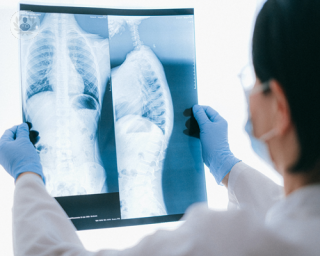Lung function test
Dr John Seymour - Pulmonology & respiratory medicine
Created on: 11-13-2012
Updated on: 10-30-2023
Edited by: Conor Lynch
What is pulmonary function testing?
Pulmonary function testing is performed to determine the type of disorder affecting the lungs. It is also used to determine the stage of any lung disease present. There are different methods used.

What does it involve?
The technique of spirometry is used to measure air flow in the lungs, obtaining flow rates and volumes. It involves the patient breathing into a device called a spirometer. Results vary slightly depending on whether the patient performs the test in a seated or standing position.
Measurement of the total lung volume requires the use of an additional technique, one of the following:
- Plethysmography: This is the more precise technique. The patient sits inside an airtight transparent box similar in shape to a telephone booth. After inhaling and exhaling through a mouthpiece, the pressure changes occurring in the box are crucial in calculating the total lung volume.
- Breathing helium or nitrogen: The patient breathes the gas through a lung tube for a specific period of time. Then the concentration of the gas in the tube is measured and used to calculate the total lung volume.
Why is it done?
Pulmonary function testing is done for the following reasons:
- To diagnose pulmonary disease (asthma, bronchitis, emphysema).
- To determine the cause of breathing difficulties.
- To assess whether exposure to contaminants in the work environment has affected pulmonary function.
- To study a patient’s pulmonary function before surgery.
- To check the effect of a medication.
- To determine how well a treatment is working.
How can I prepare for pulmonary function testing?
You are advised to avoid eating large amounts of food before the tests. You must also avoid smoking between four to six hours before the tests. The specialist will tell you if you have to stop using a bronchodilator or other inhaled medicine. Similarly, you may have to take an inhaled medicine just before or just after the pulmonary tests.
What will I feel during the evaluation?
During the testing, you may experience difficulty breathing or dizziness due to the rapid and forced breathing you are asked to do for correct performance of the test. You may also experience claustrophobia when you sit inside the box - this may be the most uncomfortable part of testing.
What do abnormal pulmonary function testing results mean?
An abnormal result means that you may have a lung or chest disease. In emphysema, asthma, chronic bronchitis and infections, the lungs contain too much air and take longer to empty. This type of disease is called obstructive pulmonary disease.
This type of testing can also reveal other types of lung disease. For example, diseases in which the lungs scar and become smaller, such that they cannot hold much air and cannot correctly perform their function of sending oxygen to the blood. If you have weak muscles, this will also be reflected in the results. Some of the diseases are:
- Extreme obesity
- Lung fibrosis
- Sarcoidosis and scleroderma







